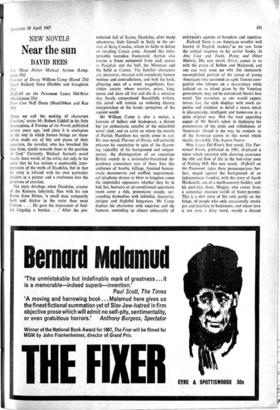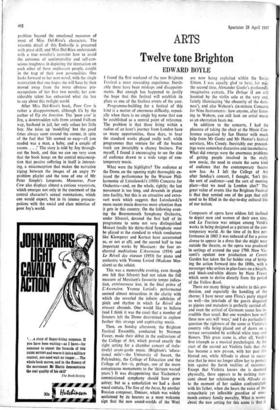NEW NOVELS
Near the sun
DAVID REES
Flavour of Decay William Camp (Blond 25s) Stitch Richard Stern (Hodder and Stoughton 21s) Daffodil on the Paventesti Laura Del-Rivo (Hutchinson 25s) Poor Cow Nell Dunn (MacGibbon and Kee 18s) 'Since we call the making of characters Creation,' wrote Mr Robert Liddell in his little masterpiece, A Treatise of the Navel, published twenty years ago, 'and since it is analogous to the way in which human beings are them- selves made out of bits and pieces of their ancestors, the novelist, who has breathed life into them, stands towards them in the position of God.' Certainly, Michael Ayrton's novel recalls these words of the critic, not only in the sense that he has written a memorable inter- pretation of the myth of Daedalus, but in that his story is infused with his own particular insights as a painter and a craftsman into the processes of creation.
The story develops when Daedalus, creator of the Knossos labyrinth, flees with his son Icarus from Minos, 'a small man, compactly built and thicker in the waist than most Cretans. . . . He gave the impression of find- ing kingship a burden. . .1 After the pre- ordained fall of Icarus, Etaedalus, after many adventures, finds himself in Sicily in the ser- vice of King Cocalus, whom he helps to defeat an invading Cretan army. Around this indis- pensable narrative framework Ayrton also creates a frieze composed from such ,stories as Pasiphad and the bull, the Minotaur and the Sybil at Cumae. The familiar characters are, moreover, invested with completely human motives and contradictions, and with the hard, glittering aura of a cruel, magnificent, fear- ridden society where warrior, priest, king, queen and slave all live and die in a universe they barely comprehend. Beautifully written, this novel will remain an enduring literary interpretation of the heroic springtime of the ancient world.
Mr William Camp is also a maker, a laureate of failure and inadequacy, a distant but yet enthusiastic annalist of the unfaithful wives' club, and an artist on whom the mantle of Patrick Hamilton has surely come to rest. His new novel, Flavour of Decay, will certainly enhance his reputation in spite of the disarm- ing topicality of his background and subject- matter, the disintegration of an expatriate British society in a nationalist-threatened de- pendency somewhere east of Suez. Into this ambience of bombs, killings, frenzied bureau- cratic manoeuvres and muffled, ungrammati- cal telephone threats to blow to kingdom come the imperialist oppressors whether they be in bed, bar, barracks or air-conditioned operations room come a rich, pretentious couple, sur- rounding thethselves with infidelity, insecurity, intrigue and frightful hangovers. Mr Camp deploys his characters with expertise and sly humour, reminding us almost unbearably of everyman's agonies of boredom and rejection. Richard Stern is an American novelist well known to , English readers! as we saw from the critical response to his earlier books, In Any Case and Teeth, Dying and Other Matters. His new novel, Stitch, comes to us with the praise of Bellow and Malamnd, and one can very soon see why this immensely accomplished portrait of the group of young Americans who surround an aged, famous corn- patriot who labours on a masterpiece while isolated on an island given by the Venetian government, may yet be considered Stern's best novel. The narrative, as one would expect, moves fast, the style displays with much ex- pertise and attention to detail a vision which is idiosyncratic, intelligent and humorous in a quite original way. Not the least appealing aspect of Mr Stern's talent in deploying his presentation of the trials and tribulations of Americans abroad is the way he reminds us of the Jamesian canon in this novel which recalls, inevitably, The Aspern Papers.
Miss Laura Del-Rivo's first novel, The Fur- nished Room, published in 1961, displayed $ talent which recorded with alarming assurance the ebb and flow of life in the bed-sitter zone of Notting Hill. Her new novel, Daffodil on the Pavement, takes these preoccupations fur- ther, staged against the background of an indeterminate London, with the story of Jacob Fiardcastle, son of a north-country builder, and his part-time doxy, Maggie, who comes from somewhat insecure world of foster-parents.
This is a deft story of life only partly on the fringe, of people who only occasionally smoke, pot and topulate in bathrooms, and where love is not even a dirty word, merely a distant problem beyond the emotional resources of most of Miss Del-Rivo's characters. The miasmic detail of this Endsville is presented with great skill, and Miss Del-Rivo understands with a true novelist's restraint how to avoid the extremes of sentimentality and self-con- scious toughness in depicting the interaction on each other of these unpleasant people, caught in the trap of their own personalities. One looks forward to her next novel, with the single reservation that one hopes she will have by then moved away from the more obvious pre- occupations of her first two novels; her con- siderable talent has exhausted what she has to say about this twilight world.
After Miss Del-Rivo's book, Poor Cow is rather a disappointment, although it's by the author of Up the Junction. The 'poor cow' is Joy, a downtrodden wife from around Fulham way, husband in jail, her only solace her little boy. She takes up 'modelling' but the good times always seem around the corner, in spite of the fact that 'life seemed so easy—all you needed was a man, a baby, and a couple of rooms. . . .' The story is told by Joy through- out the book, and thus we can see very soon that the book hangs on the central misconcep- tion that passive suffering in itself is interest- ing, a misconception that makes the narrative zigzag between the images of an angry TV problem playlet and the tone of one of Mr Peter Simple's lampoons. Moreover, Poor Cow also displays almost a curious voyeurism, which emerges not only in the treatment of the central character's sexual ruminations, which one would expect, but in its intense preoccu- pations with the social and class minutiae of poor Joy's world.







































 Previous page
Previous page